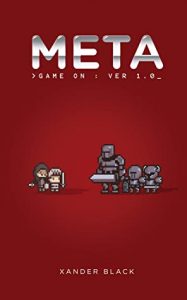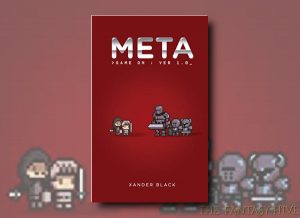META: GAME ON by Xander Black (BOOK REVIEW)
‘The Cyberage was one of atheism and isolationism. It was unsurprising that over the years, as people looked for meaning in their lives, new ideologies emerged.’
‘Live to Play’
 Xander wasted a lifetime creating cheap disposable ideas to sell cheap disposable products. He’s now focused on creating cheap disposable stories. When not writing he’s reading, watching film & TV, hanging with Sarah, Hesper, and Hattie, and occasionally playing the odd video game. He has a few more stories brewing that may be disposed of soon.
Xander wasted a lifetime creating cheap disposable ideas to sell cheap disposable products. He’s now focused on creating cheap disposable stories. When not writing he’s reading, watching film & TV, hanging with Sarah, Hesper, and Hattie, and occasionally playing the odd video game. He has a few more stories brewing that may be disposed of soon.
Xander Black’s, Meta: Game On, shocked me. I had no idea what to expect upon opening my review copy, diving into the metaverse and the world of Brith, but it wasn’t this phantasmagorical insight into our collective, speculative future in VR. The bulk of the novel is set in Brith, a VRMMORPG (Virtual Reality Massively Multiplayer Online Role Playing Game), and Brith is littered with SFF Novums, freaky happenings and game-play cliches. From the Cult of Virtualism spreading religious teachings across the virtual world to Zombie-riots interrupting the games narrative, Black packs in an incomprehensible amount of detail and satirical nuance, challenging our contemporary and ever-changing relationships with technology, the world and each other.
‘There was of course one other factor: Cyberspace. Thanks to the creation of the cybernet […] almost everything could be done without leaving home.’
When talking about Meta: Game On, it is impossible to ignore the allusions Black makes to other texts, media and contemporary issues, beginning of course with the ‘ASTROVID-42’ pandemic that has forced the humans of the future into lockdown.
‘In the early 2040s, the extremely contagious pandemic ASTROVID-42 had forced many into their homes for six months. People shopped, worked, went to school and socialised from home. What was surprising is that after the crisis had passed no one really wanted to come out.’
 The backlash of ASTROVID-42, i.e that no-one wished to leave their homes, is a hilarious acknowledgement of the ‘work from home,’ bug that has infected the post-covid world. During the COVID-19 pandemic of 2020 (onwards) many learnt the luxury of working from home and obtaining a little more of a work-life-balance. Many of our friends and colleagues still refuse to re-enter the realm of the office, opting instead to stay at home. During the ASTROVID-42 pandemic in Black’s novel, people began to spend more and more time in the Metaverse, and when the pandemic began to ease-off there was no reason for anyone to go back to, what was once, ‘normal.’
The backlash of ASTROVID-42, i.e that no-one wished to leave their homes, is a hilarious acknowledgement of the ‘work from home,’ bug that has infected the post-covid world. During the COVID-19 pandemic of 2020 (onwards) many learnt the luxury of working from home and obtaining a little more of a work-life-balance. Many of our friends and colleagues still refuse to re-enter the realm of the office, opting instead to stay at home. During the ASTROVID-42 pandemic in Black’s novel, people began to spend more and more time in the Metaverse, and when the pandemic began to ease-off there was no reason for anyone to go back to, what was once, ‘normal.’
The novel is set several years after ASTROVID-42, in the year 2064, and most people spend their time in VR. Everyone gets the same pay in the real world, so one does not need to stress about work. Many still choose to work, in or out of game-play (one of the few surviving real-life roles that has not been taken over by an AI is hair-dressing / barber), and many who play strive to become ‘someone’ in the game, to obtain sponsorships from companies (another allusion to today, a huge nod at the roles todays youngsters strive for: online video game streamer / influencer paid through sponsorships online).
‘the Year 2064 did not turn out as many had predicted. We weren’t on the verge of an environmental disaster, there were no warring nations fighting over scarce natural resources as many economists had hypothesised, nor were there any post-apocalyptic mutants rampaging through abandoned streets. There was, however, no doubt that the streets were abandoned, and there was occasional suggestion that a few post-apocalyptic mutants might liven things up’
Black introduces us to this future world and the virtual world through several different groups of characters. The narrative is built up by following; Vanja and Sir_Pendulous_Wang cocky and confident Meta players (Wang loves drawing giant penis’s on those he slays), Cyrus and Everett (friends, who seem to have stumbled into something bigger than themselves), Detective Booth (investigating murder), Ava / Kyra (custom built AI’s who exist only in Brith), The Polymath (spoilers!) and many other characters, until the climax at the very end when they are eventually all together. The reader is also fed information by the game company: Arctik Studios, through employee style memo’s that are littered throughout the book.
‘“Sir_Pendulous_wang, Knight of the Golden Order. This is Vanja, a Rider of Crad, Ava the Avatar of Skara Bae, Cyrus… um… a man of integrity, and Evertt… who is… uh… also a man,” Wang struggled to think of anything to add and left it there.’
There are countless hilarious anecdotes and strange happenings in Brith, such as towns being built for would-be serial killers to live out their fantasies (Simpson Valley), Furries (yes, those kinds) hiding in secret towns because other players often hunt them for fun, and what appears to be an incredible amount of Sex in Virtual-Reality (cybersex). Black leaves absolutely no stone unturned in the VR world he has skilfully built, usually one is left with numerous questions, but throughout the narrative, Black mixes in believable social commentary, mythologised historical context and snippets of detail that fill in every blank one might uncover. There are also, many creatures and characters that roam the realms of the Metaverse, but a particular favourite of mine would be The Skin Creeper.
‘The skin creeper, for example was so creepy it actually had the word ‘creep’ in its name. These human size arachnid-like monsters possessed a sharp razor like legs and a head that resembled a human skull. They would kill their victims with a potent venom, strip their skin and crawl inside’
Yes, The Skin Creeper sounds creepy, but what I like about these rare creatures is the air of retribution that encapsulates their behaviour. They are able to sense ‘bad karma’ and target ‘individuals who had engaged I unsavoury practises.’ Unlike other creatures in game-play, who might target victims opportunistically, The Skin Creeper devours those who actually deserve it.
Whilst all of Black’s characters have their own charm, Cyrus has an edge of realism that is rare. This is either due to my personal connections with him (PhD Student, effected daily by a chronic pain illness) or the potential for authorial influence. I have very little evidence for this claim, but Cyrus’ pain, and emotive influences in the narrative feel like more than a pure construction.
“Cyrus felt like his life was heading back to where it should be. A state of blissful, uneventful mediocrity. That’s how he liked it. He should never have been caught up in all the Meta and murder nonsense.”
There is an unbelievable number of allusions and echoes within the narrative, I actually lost count, but a few of the more notable mentions include: Alice and Wonderland, Game of thrones; “Winter is coming for all of you” […] “I thought that phrase was copyrighted,” the band Queen; ‘is this real life? Or just fantasy?’ the mention of Mc Hammer; ‘its hammer time’ and truly uncanny connections with the television series WestWorld, particularly with the pre-occupation with Artificial Intelligence, true sentience and concerns regarding the disruptions to the narrative (all of which dominate the television series and the plot line). There is a distinct echo of The Hitch Hikers Guide to the Galaxy, as well. However, I only really see this in the tone of Black’s writing, and the inclusion of UniversalTalk®, giving players the ability to talk to each other without any language barrier, which screams of Babel Fish influence.
‘Thanks to the UniversalTalk® engine, cyberspace was a world without barriers. People from every corner of the globe were able to chat and interact in real time without difficulty. UniversalTalk® was now integrated into almost every communication system worldwide.
Black’s novel has been described as ‘the closest thing I’ve seen to Douglas Adams in cyberspace,’ an opinion I can respect and understand, but do not wholly agree with. There are numerous other echoes of the great ‘Hitch Hikers Guide’ novels that freckle Black’s pages, but the humour is different. It isn’t fair to put Black into the same authorial-box as Adams because of the simple fact that Black’s humour is focused on satirical nuance, focused on confronted the contemporary world and the people who live in it, dripping with relatable and familiar context, unlike Adams’ tendency to write with dark wit, piggy-backing off class British humour, and the excessive use of ridiculous situations (which are not bad things at all, just different to Black).
“longevity in environments like Brith is quire at odds with reality. The longest-lived characters are generally the most uninteresting and undistinguished. To put our findings to a single phrase, longevity in cyberspace is essentially, ‘Survival of the shittest.’
As you might be able to tell, I could talk about this text for hours, but I won’t. I hope this text is received as it should be. As a hilarious masterpiece! It is unprecedented in its exploration of a virtual world, expertly built by the careful pen of Xander Black. The narrative wreaks of chaos and confusion, in a deliciously addictive way. Black confronts human relationships in a blunt and relatable way, that I did not want to spoil in my review… so you will have to find out for yourself! I for one, was delighted to hear that there is another text coming… and I am so excited to find out what happens to Cyrus and Everett in the next one…
‘Live to Play’
Meta: Game On is available now on:

